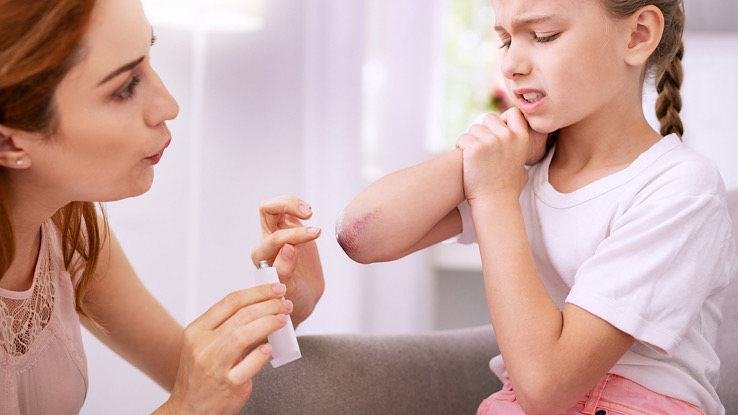
Now that you disinfected your wound and the bleeding stopped, what can you do to help the wound heal faster? Proper treatment and healing tips vary based on the severity of the wound type. Try some of these methods to heal your wound faster. But be sure to still seek your doctor’s advice for the best way to heal your wound quickly.
Help Light Wounds Heal Faster
Light wounds can include minor abrasions, scrapes, or light lacerations, such as paper cuts, a scraped knee, or rug burns. Often, these minor wounds heal spontaneously with no additional care, but these tips may speed up healing time.
- Apply aloe vera to the wound site. By keeping the wound area moisturized, you can place less stress on the injury to support quicker healing.
- Air it out when needed. Light abrasions such as rug burns may ooze fluids in the healing process. Rather than rigorously wiping it away, further, irritate the wound, and let it air dry by itself. However, if the wound is oozing blood or pus-like fluids, it is time to see a doctor for a possible infection.
Help Moderate To Severe Wounds Heal Faster
A doctor should immediately see moderate to severe wounds and take care of them for proper disinfection and bleeding termination. Afterward, these tips may be utilized at home, at the discretion of your doctor, to help shorten healing time.
Please keep it clean. Per your doctor’s instruction, keep the wound clean to ensure proper and speedy healing. If possible, change bandages daily to keep the area free of bacteria.
- Limit your movement of the affected area. The capillaries and connective tissues at the wound may need time to reconnect and heal. If the skin and tissues are constantly stretched and moved around, it will prolong healing time. Nonetheless, try to stay active and go outside for a walk.
- Take the recommended medication. Sometimes, doctors may prescribe a course of antibiotics or vitamins to combat potential infection. It is essential to finish the entire duration of the remedy as instructed, as an infection will slow down healing time.
- Have a balanced diet. It would help if you practiced a healthy diet, as moderate to severe wounds may signify damage beyond the skin, into the muscles and surrounding tissue. Vitamins B, C, E, A, zinc, and copper, all abundant in fresh fruits and vegetables, also play an essential role in wound healing. So, don’t skip your salad like you usually do – eat it!
- Try to eat a high protein diet. Studies have shown that protein can help rebuild tissues and muscles and may aid in creating collagen, which is essential in providing skin elasticity. It can also strengthen the immune system as a part of a balanced diet.
- To avoid noticeable scarring, you may want to consider investing in anti-scarring tape available in most drug stores. These tapes may help ward off raised or pitted scarring that can be painful to the touch.
Help Burns Heal Faster
It is best to seek emergency care immediately for significant or chemical burns. The tips below are for minor burns that do not require professional care.
- Do not put butter on the location. Since minor burns often occur in the kitchen, you should avoid the common myth of applying butter to the burn wound. Butter can further inflame the burn and potentially cause an infection.
- Use light moisturizing lotions instead. It is better to keep the burn lightly moisturized with a natural ingredient, such as aloe, at all times to provide relief and help it heal faster.
- Do not pop blisters. It may be tempting, but popped blisters are an open invitation for bacteria to cause possible infections and slow the healing rate. If blisters pop spontaneously, wash the area with plain water and soap, apply an antibiotic ointment, and wrap with loose gauze.
- Use loose sterile gauze or cotton cloth to protect the burn, and do not place pressure on it. Do not use heavy towels or blankets.
As a general rule of thumb, if the wound site does not heal appropriately within a timely manner, be sure to see a doctor. If the wound site starts to have pus, becomes exceptionally inflamed, and is accompanied by a fever, be sure to seek emergency care immediately.
Resource Links:
- “Wound healing: cellular mechanisms and pathological outcomes” via Open Biology
- “Impaired Wound Healing” via StatPearls
- “Current wound healing procedures and potential care” via Materials Science & Engineering
- “Factors Affecting Wound Healing” via Journal of Dental Research
- “Wound healing – A literature review” via Anais Brasileiros de Dermatologia





